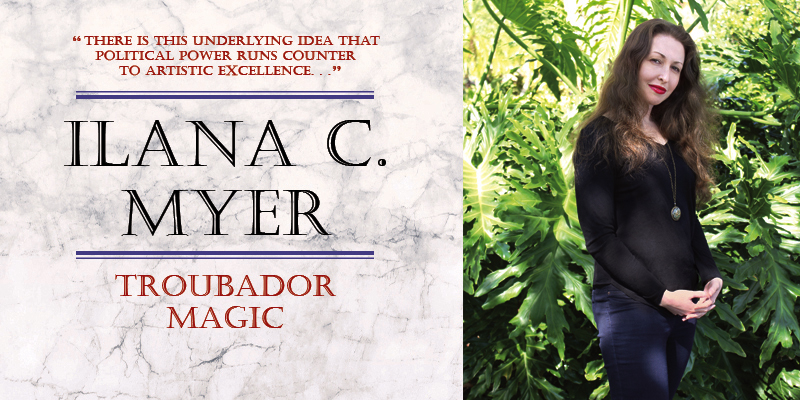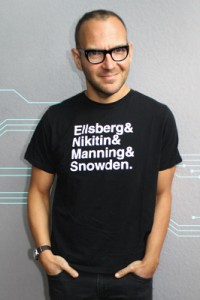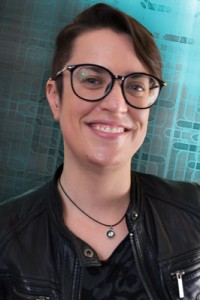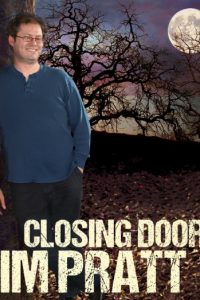Ilana C. Myer: Troubadour Magic

Ilana C. Myer was born Ilana Chaya Teitelbaum on January 19, 1981 in Queens NY, and moved to Israel with her family when she was 12 years old. She came back to the US to study English at Queens College in New York while working as a receptionist, administrative assistant, and executive assistant. She later returned to Israel, where she started a journalism career and co-founded Middle East environment blog Green Prophet. She went on to write criticism and book reviews for publications including the Huffington Post, The Globe and Mail, and the Los Angeles Review of Books. Much of her journalism was published as Ilana Teitelbaum, but she decided her surname “was too long for a book cover” and chose a pen name inspired by her grandmother’s maiden name instead. She met and married her husband in Israel, and they eventually settled in New York.
Her debut novel Last Song Before Night appeared in 2015, followed by sequel Fire Dance (2018). The final volume of the trilogy, The Poet King, is forthcoming in 2020.
Excerpts from the interview:
“I was born on the Jewish holiday of Tu BiShvat, which is the New Year of the Trees – it’s when spring begins in the Middle East. Ilana means tree, and Chaya means life, so you get ‘Tree of Life.’ I don’t think my parents actually did that on purpose, though – I think Chaya was supposed to be after a great-grandmother. I grew up in a very religious Orthodox Jewish neighborhood in Queens until I was 12 years old. I knew from childhood, because my parents would tell me, that someday we were going to move to Israel, because that was my father’s dream. My paternal grandfather was Israeli, and came to New York to make his fortune, with the intention of returning to Israel – but my grandmother wouldn’t let him. She didn’t want my father to serve in the army, so the family stayed in New York. Then my grandfather died very young, so that dream was instilled in my father on a deep level. He wanted to return to Israel where he had family, eight generations in Jerusalem.
“When I was 12 we moved to Jerusalem. I was utterly unprepared. I’d studied Hebrew the way American Jews study Hebrew, which is that in school I learned this pathetic version of Hebrew that did not serve me at all in the real world. So I attended high school in a foreign language and had no idea what was going on most of the time. It was actually pretty traumatic, but I can laugh about it now. I had always been so in love with the English language and English literature, and to be plunged into an environment where none of that was any use to me at all was terrible – you know, all of a sudden the language you love is worthless, because you’re going to fail at math.
“I ended up coming back to Queens for college. I went to Queens College and studied English literature. At the time I felt uneducated in the Humanities, because in my Jerusalem high school, the most advanced English class available was for people who could actually speak English, and I would say, ‘Can you give me extra assignments, please?’ I was hungry for knowledge and development. College was a tremendous gift in that regard.
“As a college student, my challenge was to survive in New York City. I was an administrative assistant in Manhattan and shared a basement apartment with other students. I already knew – had always known – that I wanted to write novels, and that seemed to contraindicate investing in a practical career. I know a lot of people would disagree, but I could only envision myself succeeding in two professions, in law or psychology, but I could not imagine doing well in those professions while simultaneously writing novels. Those are careers that require significant investment or they’re not worth doing. I thought, ‘Okay, I have to do something that’s not mentally challenging, so I can write when I get home.’ I took a job at a call center. It was awful, and I could not write when I got home. I worked in the Empire State Building for a sexually abusive boss – it was a crazy job, people were getting fired constantly all around me – and I’d come home to my basement apartment completely exhausted.
“My father was always trying to get me to move back to Israel, and I always said, ‘No way.’ I thought I was done with that. But he really wanted me to come back to Israel and get married. He said, ‘I’ll make a deal with you, if you come back to Israel for a year.’ It was a truly generous offer: he would support me for a year sharing an apartment with other women in the Katamon neighborhood of Jerusalem – where all the singles are. And here was the kicker. He said, ‘You can work on your book for a year.’ No more call center. No more boss who put his hand on my hip in meetings. I looked around my basement apartment. What did I have to lose? And of course, I could always come back.
“So I returned to Jerusalem, shared an apartment with other women, and met a lot of Orthodox men in the singles scene. That did not work out, but I made some friends. By the end of the year, I told my father, ‘It’s been great, but I’m going back.’ At that point I was 25, which in Orthodox terms meant I should have been married for a few years with at least two kids. But just as I was about to leave for New York, I met my husband, and that was how I got stuck in Jerusalem for another six years.
“At that point my husband Jack was still in university, studying philosophy, and we needed money rather badly. I was determined that this time, I’d find a way to make money by writing. That was how I got my start as a freelance journalist in Jerusalem. I began by pitching stories to outlets like The Jerusalem Post – but that was not enough to support us. I took a course in grant writing and started writing grant proposals. I got a part-time gig writing content for websites. I kind of cobbled it all together. I was working all the time.
“My experience in journalism was a revelation, because it forced me to learn about things I didn’t know anything about, and talk to people I wouldn’t have spoken to. At that time I was shy and introverted, and you can’t last that way as a journalist. I had to start talking and asking questions. I went to a prison for violent criminals to interview them – I did things that I would never have thought possible. Israel is such a complex place, beyond what makes news headlines. There are so many layers of complexity, and I got to explore that from numerous angles. The experience was valuable in ways that carried over to the rest of my life.
“I started writing Last Song Before Night, my first published novel, while I was in that job in the Empire State Building. My coworkers teased me about it. I scribbled ideas on a legal pad in Starbucks during my half-hour lunch break. It was the consuming obsession of my life to write this book, while I was in a job that was consuming my life. When I got to Jerusalem, that’s when the real work started. During that first year, I wrote 100,000 words of a first draft. By the end of the year, I knew that the draft was bad and I had to rewrite it.
“I rewrote the book, not just to improve the writing. There was also the stuff that happened in terms of my relationship with religion as I was writing this book, because throughout my early twenties I was grappling with Orthodoxy. I really believed in it, but I also had so many issues with it that became more urgent with the passage of time. As I progressed through my early twenties, I started to lose my belief more and more, but I was still in the grip of Orthodoxy when I wrote that first draft, so it was informed by certain restraints. For example, there was no religion in the first draft at all, because in Orthodox Judaism, to depict even an invented religion would be idolatry. It felt deeply taboo. But as I set out to revise that draft, I found myself looking at it clearly. I thought, ‘The Lord of the Rings could get away with a world with no organized religion, but I cannot. These characters are not believable if they don’t have a religious life, because religion is such an integral part of the human experience.’ So, ironically, as I was losing my belief in religion, I was becoming more aware that my invented world needed religion. Somehow Tolkien did without religion – The Lord of the Rings is fine the way it is – but I don’t know of anyone else who could get away with that. There’s something very spiritual that pervades Tolkien’s writing. It’s this ineffable sense that you don’t need gods or deities, because there’s a pervasive element of spirituality in the text itself.
“I have a deep love of Lord of the Rings, and a deep admiration of Tolkien – it wasn’t the beginning of fantasy for me, because he’s more advanced, and I was reading fantastical works from childhood. If there is any fantasy author that has been the biggest influence on me, it’s probably Lloyd Alexander. I keep returning to the Prydain Chronicles and finding new reasons to love them. There’s also E. Nesbit, Susan Cooper, and there’s something fantastical about Frances Hodgson Burnett’s works, like A Little Princess and The Secret Garden, even if there isn’t magic in them. All these works drew me to fantasy fiction before I found Tolkien.”
Interview design by Stephen H. Segal. Photo by Francesca Myman.
Read the full interview in the May 2019 issue of Locus.
 While you are here, please take a moment to support Locus with a one-time or recurring donation. We rely on reader donations to keep the magazine and site going, and would like to keep the site paywall free, but WE NEED YOUR FINANCIAL SUPPORT to continue quality coverage of the science fiction and fantasy field.
While you are here, please take a moment to support Locus with a one-time or recurring donation. We rely on reader donations to keep the magazine and site going, and would like to keep the site paywall free, but WE NEED YOUR FINANCIAL SUPPORT to continue quality coverage of the science fiction and fantasy field.







